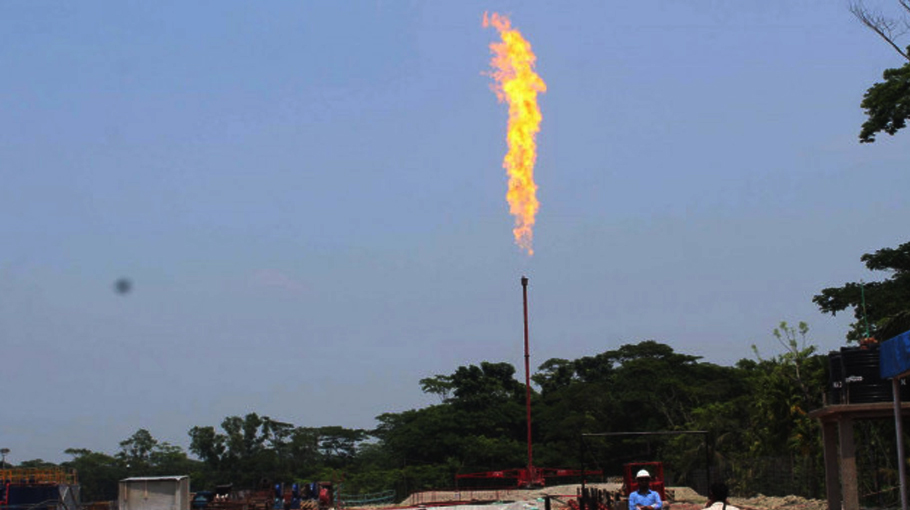Massive gas reserves found in Bibiyana, Ilisha-1 fields

In a groundbreaking revelation, State Minister for Power, Energy, and Mineral Resources Nasrul Hamid has disclosed that the recently drilled wells at the Bibiyana gas field may harbor an astonishing one trillion cubic feet (Tcf) of natural gas reserves.
This remarkable discovery, coming after Chevron Bangladesh successfully completed its 27th well at the field, marks a turning point for the nation's energy landscape.
Adding to this optimistic outlook, the newly identified Ilisha-1 gas field in Bhola district, positioned as the country's 29th gas field, is estimated to hold a substantial reserve of 200 billion cubic feet (bcf) of gas.
Situated 182 km away from the capital Dhaka, Ilisha-1 contributes significantly to diversifying Bangladesh's gas portfolio.
Addressing the press at the secretariat on his last day as State Minister, Nasrul Hamid assured the nation that despite challenges, Bangladesh is well-prepared to ensure an uninterrupted power and energy supply throughout 2024. "We are also geared up to tackle potential energy supply tightness if it arises," he declared, instilling confidence in the nation's energy security.
However, while these discoveries paint a promising picture, urgent attention is required to address the current gas situation in Bangladesh, where domestic natural gas production has hit a decade-low.
Policymakers are urging to proactively navigate through this challenge and implement effective solutions to enhance the nation's energy resilience.
Currently facing a dependency on costly Liquefied Natural Gas (LNG) imports due to delays in exploring new gas fields, Bangladesh produced approximately 2,300 million cubic feet per day (mmcfd) of gas from 22 domestic gas fields as of May 2023. To bridge the gap, the nation imported about 700 mmcfd, leaving a deficit of about 1,000 mmcfd in gas supply.
Despite these challenges, Nasrul Hamid emphasized the government's commitment to transitioning the power and energy sector out of subsidies in the coming years. Pricing issues are under active consideration, showcasing the government's dedication to create a sustainable and self-sufficient energy framework.
Mir Mohammad Aslam Uddin, Senior Information Officer at the Ministry of Power, Energy, and Mineral Resources, expressed hope in the recent gas reserve discovery at Ilisha-1, acknowledging its potential positive impact on the nation's energy landscape. Although a pipeline from Bhola to Dhaka is projected to take three years to establish, the potential benefits for the industry sector, including the conversion to Compressed Natural Gas (CNG), are substantial.
The depletion of natural gas reserves has led to challenges in electricity generation and a shift towards coal as an alternative, complicating the energy sector. The government's intermittent curtailment of LNG and coal imports over the past two years reflects a response to dwindling foreign reserves and aims to safeguard future energy security.
Despite a 5.26 percent decline in the country's current natural gas production capacity from local fields since 2012, experts stress the imperative for exploration and extraction from both onshore and offshore sources. To avert an energy catastrophe, a robust energy policy encompassing the tapping of untapped wells, exploration of new sources, and efficient resource utilization is essential.
Efforts to eliminate gas wastage and curb leakage through dilapidated pipelines will further contribute to addressing the crisis. Immediate action is crucial as the nation stands at a critical juncture, where energy source limitations threaten future growth and development.
While residents in Dhaka are currently facing challenges due to the gas crisis, with impacts on daily activities and living costs, the recent gas reserve discoveries offer a beacon of hope. As the government works towards resolving challenges in the power and energy sectors, including the shortage of dollars and cash, it remains imperative to explore domestic energy sources and find effective solutions before the crisis escalates.
Meanwhile, the Bangladesh Energy Regulatory Commission implemented the new rates on January 2. At the consumer level, the price of 12 kg of LPG gas increased from Tk 1,404 to Tk 1,433. Which is expensive for all consumers.
A month earlier as of November 2023, the Commission fixed the price of one kilogram of liquefied petroleum gas (LPG) at Tk 117.02 on December 3. This was an increase from Tk 115.09 the previous month. For consumers, who already have to deal with the increase in gas prices, this is not good news.
With the Bibiyana and Ilisha-1 gas fields holding the promise of abundant natural gas reserves, Bangladesh stands on the cusp of overcoming its energy challenges and ushering in an era of sustainable growth and prosperity. The nation's resilience and proactive measures, coupled with the potential benefits of these newfound reserves, inspire confidence in a brighter and more secure energy future.




